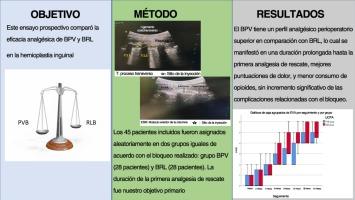Eficacia del bloqueo retrolaminar ecoguiado frente al bloqueo paravertebral clásico en pacientes sometidos a hernioplastia inguinal unilateral: estudio controlado aleatorizado
IF 0.9
Q3 ANESTHESIOLOGY
Revista Espanola de Anestesiologia y Reanimacion
Pub Date : 2024-10-01
DOI:10.1016/j.redar.2024.01.005
引用次数: 0
Abstract
Background
In daily surgical practice, inguinal hernioplasty is a frequent procedure that is frequently accompanied by severe postoperative pain. Multiple regional blocks have been described for analgesia after such operations. Retrolaminar block (RLB) is a paravertebral block (PVB) variant that provides excellent analgesia and reduces the risk of complications. This prospective trial compared the analgesic efficacy of PVB and RLB in the inguinal hernioplasty.
Methods
The 56 patients included were randomly assigned into two equal groups according to the block performed under ultrasound guidance at the T12 level: PVB group (28 patients) and RLB (28 patients). Time until the first rescue analgesia was our primary outcome. Other outcomes included the time to perform the block, changes in intraoperative hemodynamic parameters, postoperative VAS, 24-hour morphine consumption, the level of patient satisfaction, and the incidence of block-related complications.
Results
Demographic data were comparable in the two groups. However, the time needed for the block was significantly shortened with the RLB (p < 0.001). Patients in the PVB groups expressed better pain scores and lower opioid consumption. Additionally, the time to the first call for opioid analgesia showed a significant prolongation in association with the PVB. There was no discernible difference in the frequency of adverse events and recorded MAP and HR.
Conclusion
The PVB has a superior perioperative analgesic profile compared to the RLB, which manifested in the prolonged duration to the first rescue analgesics, better pain scores, and less opioid consumption, with no significant increase in block-related complications.

在接受单侧腹股沟疝成形术的患者中,超声引导下椎后区阻滞与传统椎旁阻滞的疗效:随机对照研究。
背景在日常手术实践中,腹股沟疝成形术是一种常见的手术,术后经常伴有剧烈疼痛。已有多种区域阻滞用于此类手术后的镇痛。视网膜阻滞(RLB)是椎旁阻滞(PVB)的一种变体,可提供出色的镇痛效果并降低并发症风险。这项前瞻性试验比较了 PVB 和 RLB 在腹股沟疝成形术中的镇痛效果:PVB组(28例)和RLB组(28例)。首次镇痛前的时间是我们的主要结果。其他结果包括阻滞时间、术中血流动力学参数变化、术后 VAS、24 小时吗啡消耗量、患者满意度以及阻滞相关并发症的发生率。但使用 RLB 时阻滞所需时间明显缩短(p < 0.001)。PVB 组患者的疼痛评分更佳,阿片类药物用量更少。此外,首次呼叫阿片类镇痛的时间也因使用 PVB 而明显延长。结论与 RLB 相比,PVB 的围术期镇痛效果更佳,表现在首次抢救镇痛药的时间更长、疼痛评分更好、阿片类药物用量更少,而阻滞相关并发症没有明显增加。
本文章由计算机程序翻译,如有差异,请以英文原文为准。
求助全文
约1分钟内获得全文
求助全文
来源期刊

Revista Espanola de Anestesiologia y Reanimacion
ANESTHESIOLOGY-
CiteScore
1.80
自引率
15.40%
发文量
113
审稿时长
82 days
 求助内容:
求助内容: 应助结果提醒方式:
应助结果提醒方式:


